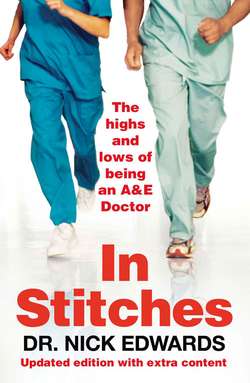Читать книгу In Stitches - Nick Edwards, Dr. Nick Edwards - Страница 9
Dealing with threatening patients
ОглавлениеI get scared sometimes at work. I work in a rather tough town – even the muggers go round in pairs. Consequently, we get some rather tough patients. Give them some alcohol and they become a little hostile. Add the stress of waiting 3 hours and 59 minutes and they become aggressive. The fact that they are often in A&E because they lost a fight sometimes results in them looking for revenge – and A&E staff are often the target.
I am a not a ‘weed’ but I am not sure that I could handle myself if I ever got into a proper fight. With a lack of any training in self-defence, and an A&E security guard that my Nan could ‘have’, you sometimes feel a little vulnerable. I have never been assaulted but I know a number of colleagues who have. The BBC programme Panorama investigated this violence and reported that a NHS worker gets attacked every 7 minutes (for more information see: http://news.bbc.co.uk/1/hi/programmes/panorama/6383781.stm). However, much of the ‘violence’ results from the confusion caused by medical problems. I have been bitten by a lady in her 80s who was short of oxygen. It wasn’t her fault – it was probably mine – I should have been more careful. When she was better she was the most beautifully placid person in the world. These are not the type of ‘violent’ patients that upset me. It is the aggressive, bullying types who know all their rights but have no sense of respect that irk me and make my job scary at times.
Last night I was at the desk, writing my notes, when a drunk and aggressive man came up to me and was forcibly complaining that I was delaying his treatment because I was being anti-Moldovan. (Maybe I need to go on a cultural awareness course, because I didn’t even realise he was Moldovan or, more to the point, where in fact Moldovia is.) All I knew was that he was a man who did not need to be seen before the bloke who need 15 sutures for a bottling injury and who was bleeding profusely.
The patient became very aggressive and angry. As he started to walk menacing towards me, I started to apologise profusely (as well as sweat profusely). Experience has taught me that this often stops aggressive people in their tracks as they are frequently expecting a fight back. Worth a try, I thought …
‘I am very sorry sir, but we are very busy tonight. We see people in order of priority and not time order, I am afraid.’
He kept shouting insults and making demands. He was not happy with his wait. Eventually, it was obvious my tactic was not working. I just wanted to ask him to leave in a firm way, but I was too scared of him. Luckily, I could see that there were two policemen in the waiting room, who had ‘smelt’ trouble and had started to walk towards me. I breathed a sigh of relief and suddenly found lots of bravado.
‘I am very sorry’, I said, before adding ‘for having to take your insults. I have been working ridiculously hard all night and don’t deserve your language or behaviour.’
My temper now started to rise. ‘If you dare speak to anyone like this again you will not be treated. Now sit down and be quiet and wait your turn. If you have a problem with this, then leave.’
I pointed to the door and felt like a brave warrior who had just defended his tribe of A&E doctors and nurses, but I knew that I was a warrior of the type that only stands up for himself in the presence of a policeman. In reality, I am still a scared wimp who is polite to rude and threatening patients purely because I am afraid of breaking my General Medical Council code of ethics of treating people in a non-judgmental way … and because I don’t want my head kicked in.
On one occasion when someone would not stop complaining and became verbally threatening, my colleague took them to the door of the resuscitation room to show them what we were doing and why his wait was so long. The complainer commented that it wasn’t his problem and later wrote a complaint letter about the psychological upset he had been subjected to. Unfortunately, my colleague has not felt compelled to be brave enough to do this again and now just ends up apologising behind gritted teeth.
It is very difficult dealing with violence in hospitals. What do you do with an injured patient who needs your care but is threatening? It is easy if they have assaulted someone as you can call the police. But bullying and threatening behaviour is difficult to deal with. Personally, I think it is time that in addition to patients having more and more rights, NHS workers had more rights and protection too – they certainly need it. Unfortunately, we have become too politically correct. The modern NHS thinks of patients as customers and we are encouraged to believe that ‘the customer is always right’ but sometimes that is just not the case.
